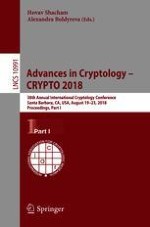2018 | OriginalPaper | Buchkapitel
Hardness of Non-interactive Differential Privacy from One-Way Functions
verfasst von : Lucas Kowalczyk, Tal Malkin, Jonathan Ullman, Daniel Wichs
Erschienen in: Advances in Cryptology – CRYPTO 2018
Aktivieren Sie unsere intelligente Suche, um passende Fachinhalte oder Patente zu finden.
Wählen Sie Textabschnitte aus um mit Künstlicher Intelligenz passenden Patente zu finden. powered by
Markieren Sie Textabschnitte, um KI-gestützt weitere passende Inhalte zu finden. powered by
